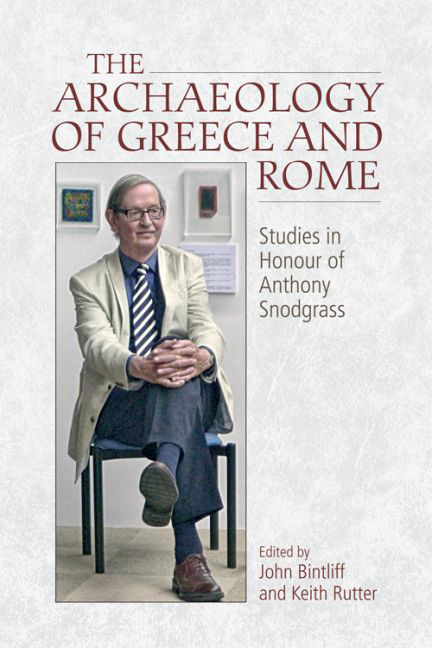Book contents
- Frontmatter
- Contents
- Preface
- List of Contributors
- List of Abbreviations
- Section I Prehistory
- 1 ‘The Coming of the Greeks’ and All That
- 2 Archaeology and the Archaeology of the Greek Language: On the Origin of the Greek Nouns in –εύς
- 3 Survey, Excavation and the Appearance of the Early Polis: A Reappraisal
- Section II Around Homer
- Section III The Archaic and Classical Greek World
- Section IV The Greeks and their Neighbours
- Section V The Roman and Much Wider World
- Section VI The Scholar in the University and in the Field: Personal Histories
- Index
2 - Archaeology and the Archaeology of the Greek Language: On the Origin of the Greek Nouns in –εύς
from Section I Prehistory
Published online by Cambridge University Press: 26 May 2017
- Frontmatter
- Contents
- Preface
- List of Contributors
- List of Abbreviations
- Section I Prehistory
- 1 ‘The Coming of the Greeks’ and All That
- 2 Archaeology and the Archaeology of the Greek Language: On the Origin of the Greek Nouns in –εύς
- 3 Survey, Excavation and the Appearance of the Early Polis: A Reappraisal
- Section II Around Homer
- Section III The Archaic and Classical Greek World
- Section IV The Greeks and their Neighbours
- Section V The Roman and Much Wider World
- Section VI The Scholar in the University and in the Field: Personal Histories
- Index
Summary
One of the most striking features of the ancient Greek lexicon is that numerous nouns in -εύς are attested both in personal names such as Ἀχιλλεύς or Ὀδυσσεύς and in common nouns like βασιλεύς ‘king’, ἱερεύς ‘priest’; the latter type denotes, in historical times, mostly humans in professional or habitual roles, and the nouns in -εύς are thus commonly classed as agent nouns. Attested from, as we now know, the Mycenaean period onwards, the history and prehistory of the formations in -εύς have occupied scholars’ minds ever since the inception of the systematic study of the history of the Greek language in the nineteenth century, and it can be said without exaggeration that the nouns in -εύς were and still are the cause célèbre of Greek word formation. This is due chiefly to the fact that while such nouns abound in Greek, cognates outside Greek are at best uncertain, and the origin of – from a Greek point of view – the nominal suffix -ευ- remains easily the most hotly contested topic in Greek word formation. In this chapter I shall attempt first of all to provide a very brief overview of the various positions, how they have been arrived at and what the problems are. The argumentation and criticism here will be kept short since a more detailed discussion of the problems will appear elsewhere. From there we shall proceed to examine the earliest – that is, Late Bronze Age – Greek evidence, which, taken in its archaeological context, can provide considerable arguments when it comes to assessing this problem.
1. The earliest attempts at explaining the suffix -ευ- are practically as old as the discipline of comparative Greek and Indo-European philology itself and are deeply steeped in the positive and constructive spirit of nineteenth-century German romanticism. These unfailingly attempt to find cognates in other Indo-European languages and therefore to project the existence of the suffix tout court back into the Indo-European parent language itself.
- Type
- Chapter
- Information
- The Archaeology of Greece and RomeStudies In Honour of Anthony Snodgrass, pp. 22 - 30Publisher: Edinburgh University PressPrint publication year: 2016



